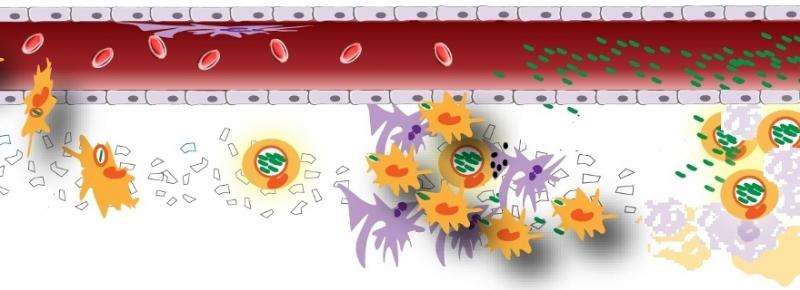Macrophages as drivers of an opportunistic infection

The opportunistic bacterium Burkholderia cenocepacia is feared by cystic fibrosis patients and is emerging in hospital-acquired infections. An international study sheds new light on the infection mechanism of this opportunistic pathogen that may have large implications for treatment strategies.
Macrophages and neutrophils are white blood cells that form our first line of defence against microbial invaders. However, in sharp contrast with their normally protective function, macrophages support the growth of Burkholderia cenocepacia and are the cause of fatal inflammation during infection in zebrafish larvae. This is the significant outcome of a study led by Annette Vergunst (INSERM, University of MontPellier), in collaboration with the group of Annemarie Meijer (IBL), which was published in PLOS Pathogens. They discovered that neutrophils, the usual suspects of inflammation, do not contribute significantly to the fatal inflammatory conditions of Burkholderia cenocepacia infection. The identification of macrophages as a critical site for replication of Burkholderia cenocepacia, rather than biofilms as generally believed, is an important insight for the design of novel therapeutic approaches to disarm this notoriously antibiotic-resistant pathogen.
Annette Vergunst did her PhD with Paul Hooykaas, and worked at Leiden University from 1991 to 2004 before establishing her independent research group in INSERM U1047 in Nimes, France. The collaboration between the Vergunst and Meijer labs has been stimulated by the European Marie Curie Training Network FishForPharma. Many intracellular pathogens have been studied in this consortium using zebrafish models, but the Burkholderia cenocepacia bacteria are the only ones that cannot replicate extracellularly in the absence of macrophages. Novel antimicrobial therapies should focus on targeting these highly persistent opportunistic pathogens during their intra-macrophage life stage.
More information: Jennifer Mesureur et al. Macrophages, but not neutrophils, are critical for proliferation of Burkholderia cenocepacia and ensuing host-damaging inflammation, PLOS Pathogens (2017). DOI: 10.1371/journal.ppat.1006437















